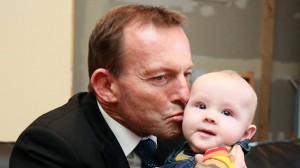considering the liberal party’s paid parental leave scheme
Tony Abbott’s proposed paid parental leave scheme to be introduced in 2015 has been described as a ‘winner’ among Australian mothers and the media. There is no doubt, if Abbott is elected, this policy will greatly benefit new mothers. But with just a few weeks until election, I can’t help but wonder; what is the Liberal incentive?
Earlier in 2013 it was proposed that if elected, the Coalition government would implement a new paid parental leave to working mothers, including 26 weeks of paid leave at their full employment wage, or the ‘Federal minimum wage, whichever is greater’.
This would be to replace Labor’s current policy scheme which provides all families with 13 weeks of paid parental leave at Federal Minimum wage. When considering the difference, there is little doubt that among prospective mothers, popularity for the Coalitions scheme would be greater.
For this reason it has been reported by journalists in several areas of Australian media that the Coalition appears to be looking out for Australian women. On top of the 26 weeks parental leave, Tony Abbott has recently announced that the policy will also provide women with superannuation entitlements while on parental leave. This could be a big step for Australian women, who, still often retire with less super than men as a result of their disproportionate child care responsibilities. However, while this progression suggests that Abbott’s heart is finally in concern for disadvantaged Australian women, an analysis of his history makes me doubt this is the case.
As a conservative Liberal politician standing in Parliament, Tony Abbott has long expressed hesitation towards supporting any policy that relieves the disadvantages women. This was seen evidently in 2005 when Abbott refused to support a policy to make the Abortion Pill RU486 widely available.
Even after the AMA publicly advocated for the drug and its potential to address the problem of limited access to contraception and abortion that is faced by many lower socioeconomic women, Abbott still refused. Despite any positive effects that public access to the pill would have for women, Abbott felt he needed to firmly stand by his conservative views.
Throughout his political career, Abbott has held close his conservative values. He has characteristically supported traditional gender roles and done little to advance female emancipation. In 2010, Tony was widely accused for assuming that women spend their time as housewives doing ironing; and after making a recent public statement about a politicians sex appeal he was again pulled up for undermining the public role of women. When asked in the election campaign this year what Liberal candidate Fiona Scott had in common with the last Liberal MP Jackie Kelly, Abbott announced that she had ‘sex appeal’. In his comment he implied that both women were appealing candidates; not because of their political competence but rather due to their physical appearance.
So considering all of this, what should Australia think of Abbott’s new paid parental leave scheme? On the surface, yes, it does appear that Tony is finally stepping up to look after the country’s working women and is working toward the feminist goal of equality. But after years of flaunting his misogyny, it somehow seems unlikely.
Just weeks away from the 2013 Federal election, it seems obvious to me that women’s rights would be last on Tony’s agenda. For Tony Abbott and every other politician in Australia at this point in time, the primary point of concern is the federal election. Until the 7th of September, every Australian will be bombarded with messages from each of their parties and their respective political campaigns. Everyone knows their goal is to gain votes; and personally I’d be skeptical of any ‘promising’ policy when voting day is this close.
In addition to the dubious timing, Tony Abbott’s paid parental leave policy is hardly logical in context of his, and the Liberal Party’s ideology. Throughout its history the Australian Liberal Party (ALP) has supported the maintenance of traditional gender roles and placed high value on supporting business and the Australian economy. Suddenly in 2013, Tony Abbott, the leader of the ALP proposes a socially progressive paid parental leave policy said to be funded through a 1.5% tax on business. In relation to their own goals, this makes little sense.
To me it seems evident that Abbott’s incentive is his political campaign. In a country in which there has long been a divide in votes between people who have conservative and progressive values, it looks to me that Abbott is trying to gain the votes of both parties. In absence of the newly proposed paid parental leave scheme, I would say that many contemporary fathers and mothers, sons and daughters would be more like to vote for Labor or Greens. But considering the familial advantages that could be gained from this scheme, many of these individuals may now actually consider the ALP.
It’s fairly obvious that the purpose of introducing the new ALP paid parental leave is to gain votes. But if this is you, please think critically. What is the benefit of introducing this policy for Tony Abbott? Ideologically, the ALP has always stood on the back of big business; not the working woman or man. If you love their policy on paid parental leave that is fair enough. But perhaps consider instead supporting Greens. Their policy on parental leave is almost identical; and I bet their values are more closely aligned with the way you want our country to be!


